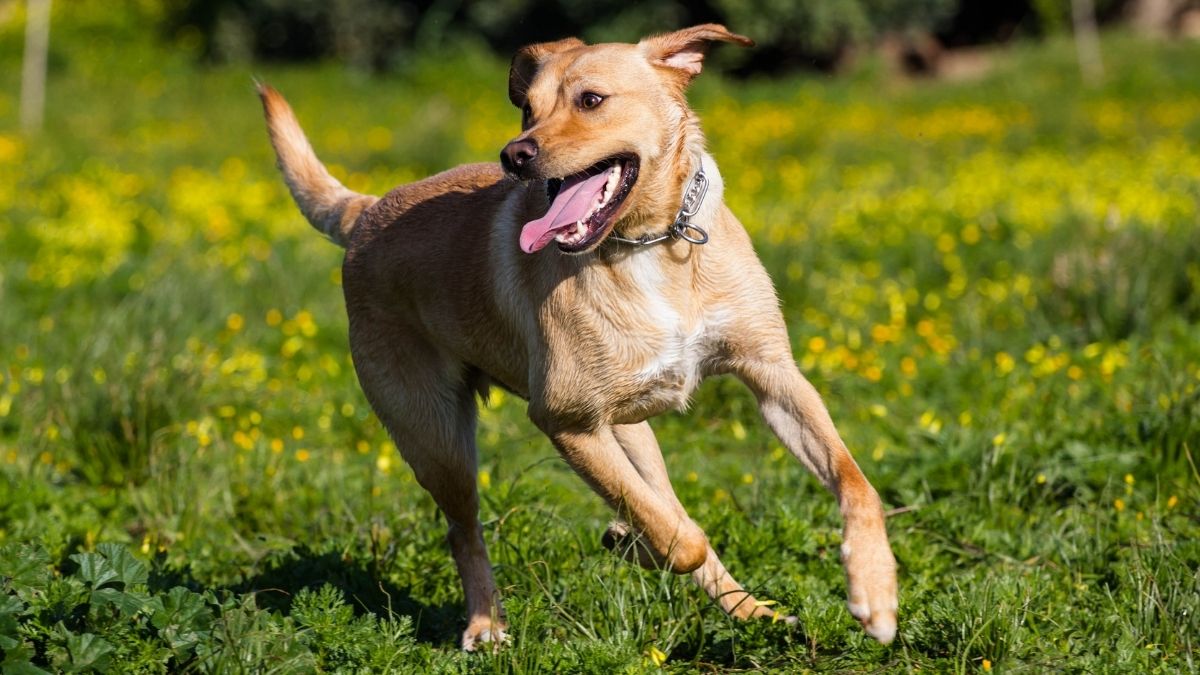Are you eager to own a Labrador? That’s laudable, but don’t move one step until you finish this article.
The information gotten from this Labrador Retriever exercise guide can save your Lab’s life.
Okay, perhaps that’s a stretch, but it can at least save your furniture from damage. That’s a win, right?
The Labrador Retriever is a highly energetic breed, and you must put that into account before bringing one to your household.
These dogs are indeed cute, friendly, and affectionate, but all those good qualities won’t mean anything if you don’t give them the sufficient exercise they need.
When a Lab is bored and restless, it would no longer be the cute, friendly, and affectionate dog you thought it was.
This guide will take you through all you should know about the Labrador exercise need.
Labrador Retriever Exercise Need: Do Labradors Need a Lot of Exercises?
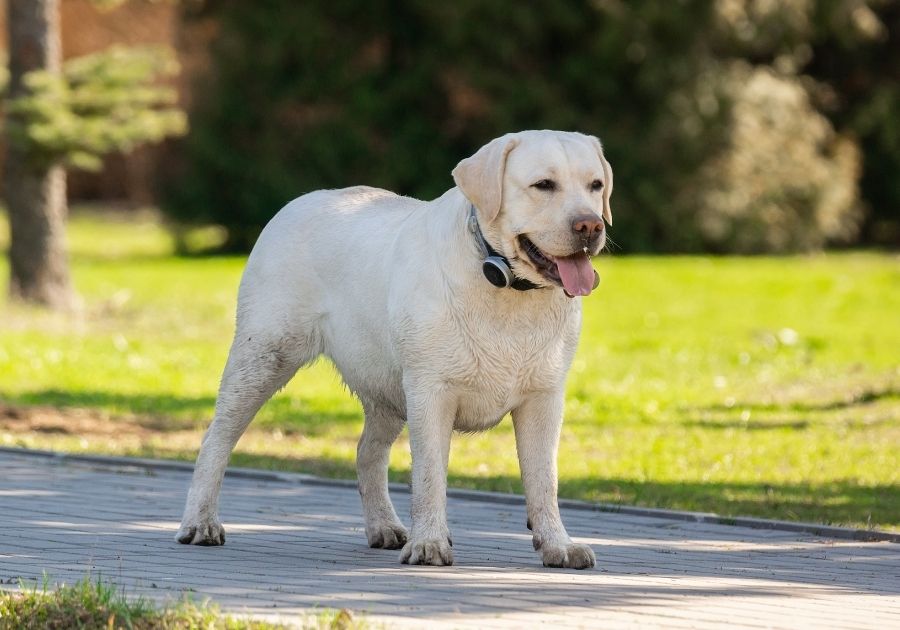
The first reason a Labrador needs exercise is the same reason every human and dog out there needs exercise.
Labs need to be fit and healthy, and exercise is one way to achieve this. A Lab that lacks exercise is vulnerable to illnesses.
Furthermore, the Labrador was bred to be a worker as well as a companion. Its ancestor, the St John’s Dog, worked alongside fishermen to retrieve fish.
This breed has since changed names and even looks, but the need for activity remains.
If you got this breed to work at a farm or for fishing, that can cover up its exercise needs.
However, many people get Labs as household companions, which means no work, making exercise the best alternative.
Also, note that the high energy of the Labrador needs an outlet. Some Labs are calmer than others, but none is lazy and laid back.
Too much energy would leave them restless, and the only way they can release it is through exercise.
Labradors are highly intelligent too, which means they tend to get bored easily and need to be challenged.
Mental activities (exercises for the mind) can help keep them busy and stimulated.
Finally, exercise is fun! You may not think so while trying to catch your breath after a jog or dealing with muscle sores, but dogs enjoy exercise. This especially applies to high-energy dogs like the Labrador.
What Would Happen if the Labrador Doesn’t Get Enough Exercise?

Neglecting a Labrador’s exercise need is just as bad as starving it of food.
This is why you should be sure you’re able to handle its exercise needs before you purchase one.
Many parents have given up on their Labs after getting overwhelmed by their exercise needs.
Here are some consequences of neglecting a Labrador’s exercise needs:
- Obesity
- Destructive behaviors
- Frustration and restlessness
Exercise for a Labrador Retriever is the healthiest way for it to let out energy. Without this outlet, your dog will look for other ways to release energy.
These methods include barking excessively, biting furniture, digging holes in the yard, chewing shoes, and even trying to escape from the house.
They make an otherwise sweet doggy look out of control, and it would be hard to calm a Lab once it gets to this level. Why not avoid this by exercising your pup?
Obesity is a problem for Labrador because it is food motivated and eats a lot.
Without exercise, it won’t burn any excess fat which would then pile, leading to your Labrador looking swollen. Obesity is a health risk that must be avoided at all costs.
It can lead to heart issues, joint problems, and increased blood pressure. Obesity also increases the risk of diabetes. Again, exercise is vital.
How Much Exercise Does a Labrador Retriever Need?
No law or standard governs the exercise level of a Labrador, and it depends on many factors like age, health, and even what subtype your Labrador falls under.
There are two types of Labradors. The field type is known as the American Labrador and is bred to work, while the show type is known as the English Labrador and is bred for events.
The American Labrador needs more exercise than the English Labrador, generally speaking.
The average exercise requirement for any adult Lab is one hour, but some get up to 90 minutes while others would be satisfied with about 45 minutes.
The Labrador should also have enough space to play, alongside toys. It is a bonus if you have kids that can match up to its energy.
How Much Exercise Does a Labrador Puppy Need?
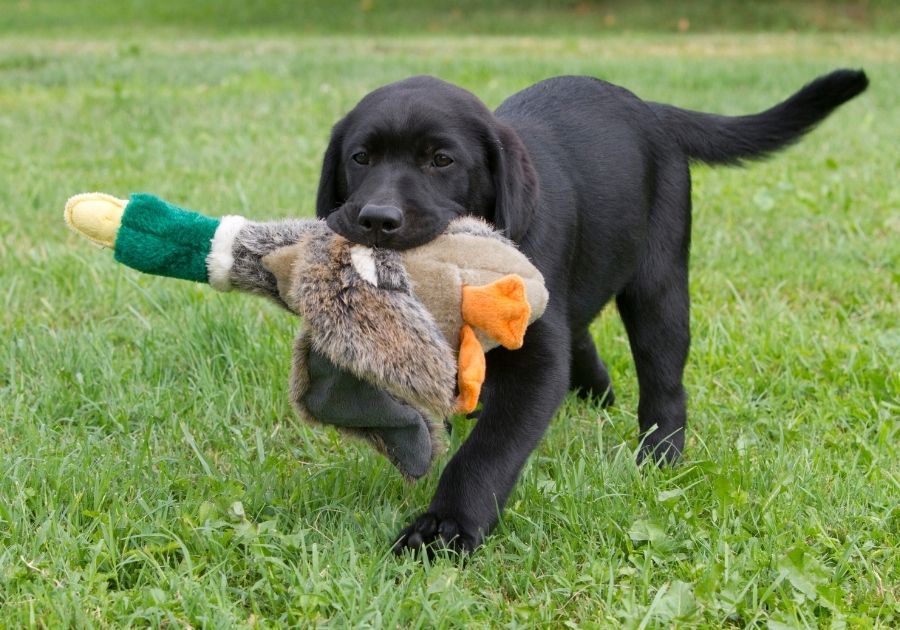
Just like any other dog breed, the Labrador puppy doesn’t need as much exercise as the adult. This is especially true during its first 3 months.
A few minutes of playtime is enough to keep a Lab puppy calm. Do not let your puppy of 3 months overexert itself, even while playing.
Its bones are fragile and can get damaged if you let them do too much.
After 3 months, experts developed what they term the “5 minutes rule”.
“The amount of exercise a dog can manage will vary between breeds and dogs.
A good rule of thumb is a ratio of 5 minutes of formal exercise per month of age (up to twice a day) until the puppy is fully grown i.e., 15 minutes (up to twice a day) when three months old, 20 minutes when four months old and so on.
As they become older, they’ll be able to cope with larger amounts of exercise.”
– The Kennel Club, UK
How Much Exercise Does a Senior Labrador Need?
The senior Labrador has lived its best days and is expected to be less energetic than adult Labradors.
Senior Labradors are also prone to many age-related illnesses like arthritis and dysplasia.
Before exercising a senior, consider their current energy level and health status. Some Labs slow down after their 7th birthday, others can stay active till 10 years.
If your senior Lab is sick, consult a vet to know how to go about the exercise.
Usually, swimming and a few-minute stroll can help. Do not leave it without exercise even if its energy has reduced, but do not overexert it either as that can be harmful.
Signs Your Labrador isn’t Getting Enough Exercise
You don’t need a seer or a neon signboard to let you know when your Labrador isn’t getting enough exercise. Some behaviors and the physical state of your pooch are enough signs.
Say it’s evening and you’re about to take a nap, but your dog is twirling in circles in the living room, barking needlessly, wagging its tail in frantic motions, or is occupied with redecorating your yard.
You should know that your beloved pooch wants some activities.
Disobedience to already learned commands is another sign of lack of exercise. Most likely your Lab is too distracted and restless to pick up what you’re saying.
Gaining weight might also mean your dog isn’t getting enough exercise, especially if you haven’t been overfeeding it and there are no other symptoms that could point to disease.
If you’re not sure how to figure out that your dog is overweight, the first thing you can do is to measure it occasionally. Is there a rapid increase between the last time and the present?
A complete absence of ribs is another sign your dog is piling pounds. You can also observe its stomach. Is it hanging between the legs?
Best Labrador Exercise Ideas
Physical Activities
There are many physical activities for dogs out there. The best way to make exercise a fun and bonding moment for both you and your pet dog is to include those activities you two can enjoy.
These exercises should tally with a Labrador’s instinct as well. Some of them are:
Walking and Hiking
A daily walk is the most common doggy sport all over, and it applies to every dog breed.
Daily walks are good as they not only help your dog release energy but also aid in socialization.
While walking, your dog gets to see new places and experience new sights. Walks are also cardio exercises for you.
You can determine how long the walk should last because left for the Lab, a walk can last all day.
This is why hiking is also good for this breed if you’re into covering long distances on foot.
If not, then you can schedule 45 minutes to an hour. It could be once a day (most people prefer early morning, evening, or night) or twice daily.
Walking has its limits, so it should not be the only exercise on your schedule. Walking isn’t much of a workout for both humans and Labradors.
Just as you also need some high-intensity exercises, the Labrador should also have other activities that get their hearts pumping.
If your dog is trained in recall, you can go off-leash on the walk. If not, then get a long leash or a retractable dog leash to give it enough freedom.
Swimming
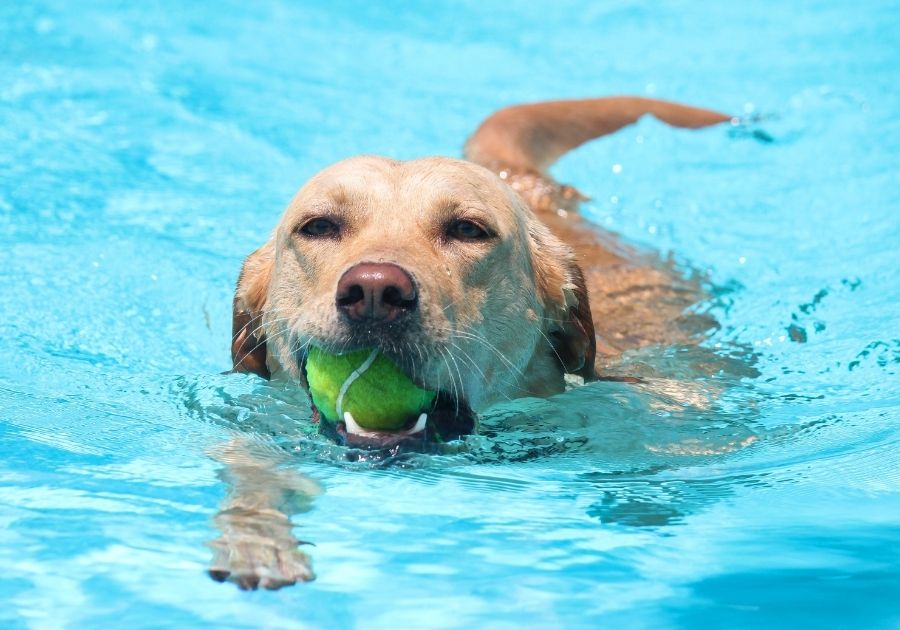
Labradors were bred to work in water, so swimming is something they enjoy and are good at by instinct.
Suffice to say that swimming is one of the best activities for this breed. The benefits of swimming for a Labrador cannot be underrated.
Swimming helps burn energy, strengthen muscles, and tones them without putting excessive strain on the joint.
Water is this breed’s element, so you’ll be doing a lot of good by taking it on a swim.
You can take the dog to a lake, the ocean, a pool, or even canine hydrotherapeutic centers if your city has one.
Swimming can be combined with other fun activities, and it can make for a family outing!
Flirt Pole
A flirt pole is also called a flirt stick and it comes with a rope. It looks a bit like a fishing hook. You attach a toy as “bait” and get your dog to chase after it.
Flirt poles come in handy when you’re too tired to exercise yourself.
It is also a good tool to use and teach your Labrador commands like Leave It. Flirt poles can be used either on land or water.
Check prices of Flirt Poles on Amazon
Fetch
Fetch is a game often associated with pet parenting, and dogs enjoy this better than other pets like cats.
For a retriever, fetching is what it was bred to do. The Labrador retriever will enjoy this game so much, that it may ask for it by bringing a ball or stick to you.
Jolly Ball
A jolly ball is another good tool for play. It can’t be torn or damaged by the dog, and some are too big for a dog to pick with its mouth.
It depends on the size and style you opt for, though. If you want your Lab to exercise its jaws, getting a smaller size can help.
Some are attached to handles and can be used for tug of war.
Frisbee Toss
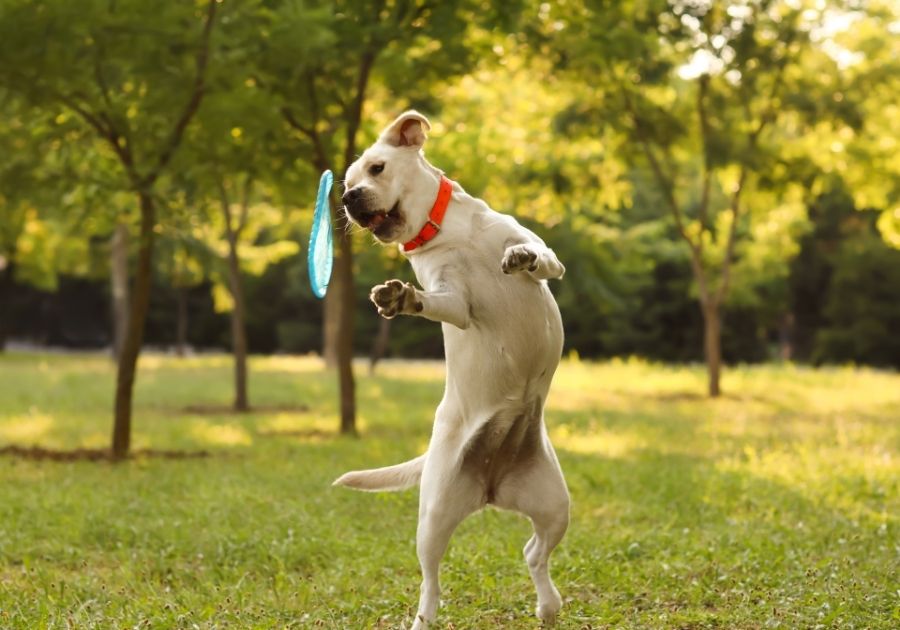
Frisbee is suitable for a smart dog like the Labrador Retriever as it enhances both its physical and mental activities.
You can start by rolling it on the ground. Then, take the game up a notch by tossing it at a low level. Keep increasing it to make it challenging.
Dog Toys
Dog toys are good, not just for Lab puppies, but also for adults.
Chew toys can help your pooch exercise its jaws while moving toys provide an opportunity for your dog to move around.
Check out these great options for dog toys on Amazon.
Yard Play
Turn your yard into a playground for your dog to have fun and release pent-up energy.
Remember that the ideal environment for the Labrador is one with enough space. You can also transform the yard into an agility and obstacle course.
You can build a DIY dog agility course yourself, or check out some affordable agility equipment on Amazon.
Running, Biking, and Other Mobile Sports
Labradors are good buddies for a morning jog, and they can also join you for a sprint along a track.
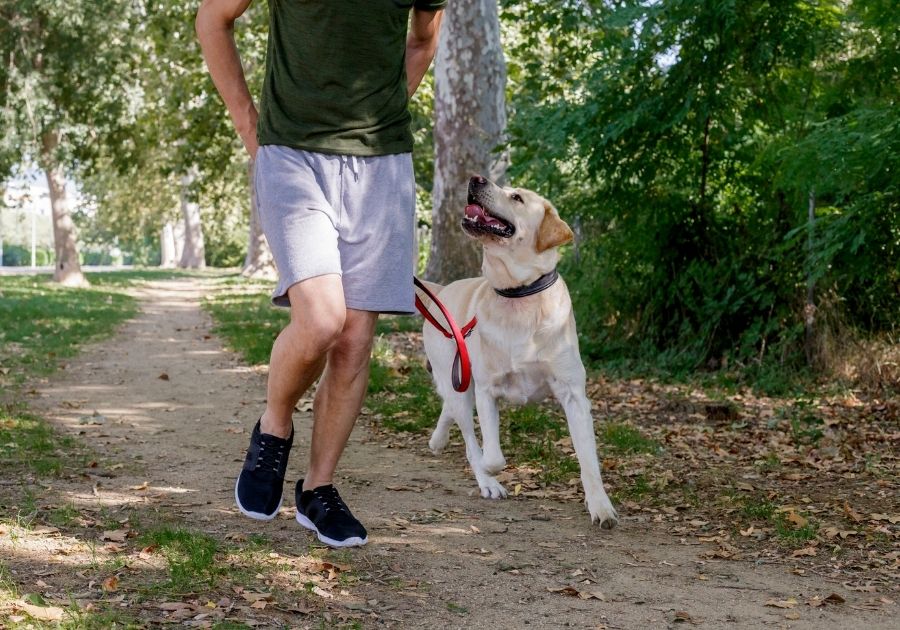
They may not be as fast as a Siberian Husky, but they do have speed. If you’re into biking, you can bring the Labrador along.
Skating is another mobile sport you can engage in with your dog moving at the side.
Tug of War
Strong and active dogs love tug of war, and it isn’t hard to see why. This is a good exercise to develop your Labrador’s strength and have fun in the process.
Before playing this game, be sure your dog can understand and respond to the Leave It command.
Playing with Other Dogs
Fortunately, this breed is not known to be territorial or aggressive towards other dogs.
You can go on a trip to the dog park with it and let it play off the leash with other dogs. But be observant, though.
That the Labrador isn’t aggressive doesn’t mean other breeds will return the favor.
Dog Sports
You can register your Labrador for some events or simply do these sports on your own with your dog.
You can also invite other pet parent friends over and have a friendly competition with them.
Mental Stimulation and Enrichment
Besides physical activities, the Labrador also needs to be mentally stimulated. It is one of the most intelligent dogs in the world and loves to be challenged.
Mental activities can take as much strength as physical activities, so they shouldn’t be undermined.
Puzzle
Puzzles are a good way to challenge a dog’s mind. It forces your Labrador to think, try ways to solve it, and stay interested in something worthwhile.
Do not underestimate a Labrador’s ability to solve puzzles. If you get something too easy, your dog will eventually get bored of it.
Check out this collection of dog puzzle toys on Amazon
Dive Deeper:
10 Ways To Provide Mental Stimulation For Dogs
Nose Game
Labradors have a strong sense of smell, and though these games are usually reserved for scent hounds, they can be beneficial for a Lab.
There are different sorts of scent games, but they often involve your dog sniffing out a delightful treat.
Chew Toys
Chew toys are good for exercising jaws and mouth, but it isn’t a physical exercise alone. It helps a dog relax, keeps it busy, and eases off stress.
Food Games
Rather than the same old feeding routine, you can spice things up with some games. Food games and other mental activities interlapse sometimes.
You can hide the food and have the dog sniff it out, or get your dog to solve a puzzle and reward it with its meal. These are only a few examples.
Environmental Games
Besides turning your environment into a playground, you can also make it a mentally challenging space.
A good example is using a mirror to show your Labrador its reflection. It can be fun to watch its reaction.
Teaching commands and tricks
Basic commands are a good way to mentally stimulate your Labrador, but you don’t have to stop there, especially if your pooch has learned them.
You can also teach it some more dog tricks like winking, high five, rolling over, and dancing.
Can a Labrador Get Too Much Exercise?
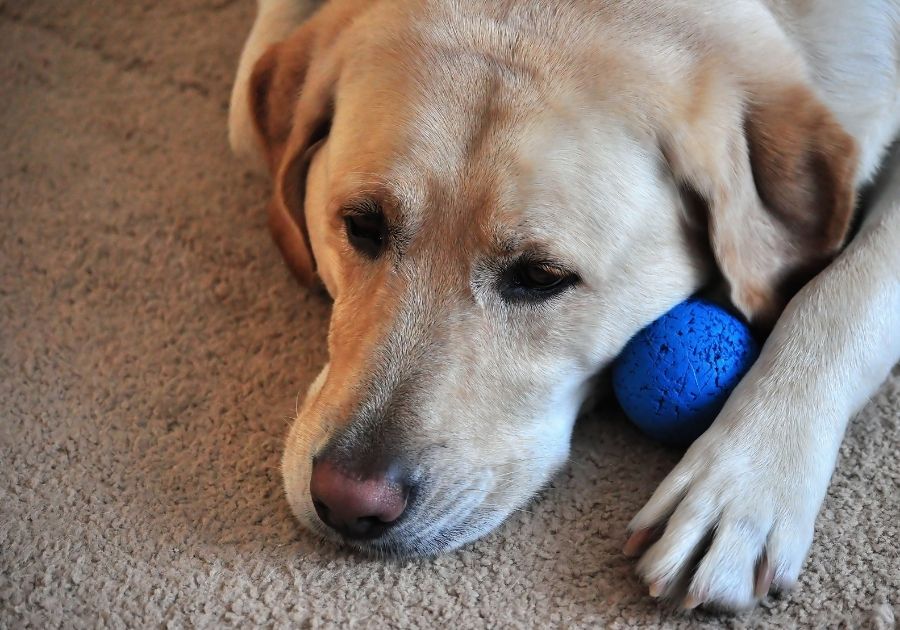
Exercising a Labrador is beneficial, but as the cliche goes, too much of anything is bad.
Overexerting a Labrador can cause exercise-induced collapse, a critical condition that may lead to death. While you should not neglect your dog’s exercise, don’t over-exercise too.
Unfortunately, dogs like Labradors don’t know when to stop. Because they were bred to work and want to please you, they can keep going even when exhausted.
Be very observant when exercising your Labrador and stop immediately you notice the signs of overexertion. Reduce the hours of exercise during hot weather too.
When a dog is exhausted, it tends to slow down, show visible signs of pain, take a longer period of calmness and recovery, drink more water than usual, and even limp.
When to Reduce Labrador Exercise
There are some special moments you should reduce the amount of exercise your Labrador is getting.
Sometimes it would be as a result of age. But there are other reasons, which include:
- Pregnancy: A pregnant Labrador can still benefit from exercising, but as the pregnancy progresses, you will need to reduce the rate of exercise it needs.
- After your dog gets spayed and neutered: It should have enough time to recover from the surgery before it engages in any exercise. Your veterinarian is in the best position to meet you know when your pooch should resume exercising.
- Illnesses and injuries: These also require limiting the exercise, especially when the dog is under treatment or in the recovery stage of an illness or surgery.
How much exercise does a Labrador need per day?
There is no fixed number of minutes or hours that a Labrador needs. It depends on age, health level, and activity.
1 hour is the standard for an adult, but it can be lesser or more. Lab puppies and seniors need only a few minutes of exercise.
Is walking enough for a Labrador?
Walking is good for a Labrador and highly advisable, but shouldn’t be the only exercise you give your dog. This breed also needs activities that would serve as an intensive workout.
Is the Labrador a lazy dog?
The Labrador is affectionate and even cuddly, but it is not a lazy dog. It was developed to be a worker and still retains that energy. This breed likes having activities to do and tend to get bored when idle.
Conclusion
The Labrador Retriever is an amazing family companion, with its cute looks and sweet disposition.
Not surprisingly, it is the most popular dog in the United States and is in the top 10 in many other countries.
With an owner who can meet the Labrador Retriever exercise needs, this energetic breed will thrive better.
Take time out of your schedule to give this breed the physical and mental stimulation it needs.

